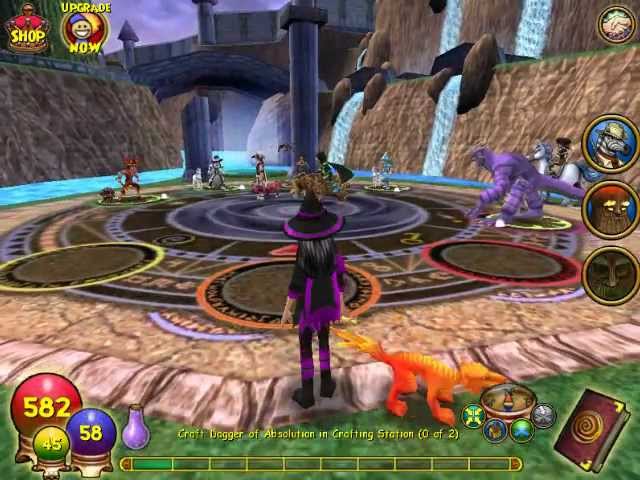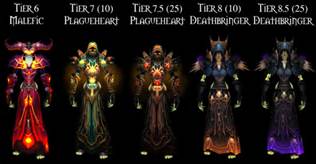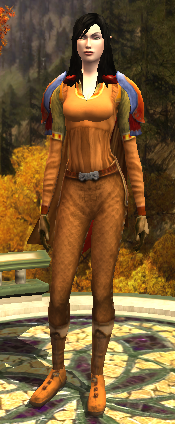“Many that live deserve death. And some that die deserve life. Can you give it to them? Then do not be too eager to deal out death in judgement.” Among those quotes that send shivers trailing down my spine, few have had as lasting an impact as these words, spoken by the wizard Gandalf in J.R.R. Tolkien’s The Fellowship of the Ring. The same lines, barely altered, appear in the wildly successful film adaptation of the novel. The raw power and beauty of Gandalf’s speech seem an inseparable part of the Lord of the Rings experience, yet not all storytelling mediums are equal where emotional attachment is concerned.
In the gaming world of Lord of the Rings Online, though the creators gave a valiant attempt at staying faithful to the book, an observant player realizes quickly that some things simply cannot transfer from page to computer screen. This fact is seen clearly in the Midgewater Marshes, a key stop in both Frodo’s quest and the player’s. While the consistent presence of physical action in the game’s rendition of the marshes engages the player’s thirst for adventure, both the novel and the film provide the audience with an enduring emotional connection, stemming from a persistent atmosphere of loneliness, a setting which highlights the plight of travelers in the marshes, and the use of central characters filled with a haunting fear of the unknown. While the memories of virtual victories eventually grow faint, the passions excited by novels and films grab hold of the audience and refuse to let go, ensuring that the magic of the stories, as well as the lessons they teach, will never fade with the passage of time.
In the game, the first item that the player notices is the convenient map residing in the top right-hand corner of the computer screen. Whenever the player doubts his sense of direction in an area akin to the Midgewater Marshes, he can simply look to the map and follow an unambiguous little arrow towards his quest’s goal. If moused over, it will even reveal how far away the goal lies. The dense fog becomes all but irrelevant, for the player’s eyes watch the arrow, not the ground before his feet.
In contrast, the novel depicts Frodo and his companions slogging through the marshy waters alone and arrowless, forever wondering where and when their dangerous travels will come to an end. How can a gamer develop a sense of Frodo’s terror when the player can never be lost? One is never truly alone, for one can always turn to the handy arrow and make off swiftly towards home. This lack of fear and loneliness prevents the player from truly appreciating how it feels to wander the spider-infested marshes alone, despite the fact that his avatar traverses those same bogs. The action is the same, yet the feeling is vastly different. The game is forever leading you gently by the hand, while the novel and its cinematic counterpart drag you blindfolded into the gloom of the unknown.
If it is clear that the game’s helpful features bar it from evoking raw emotion, how then does the novel differ? The secret lies within Tolkien’s ability to not only relay the action, as the game does, but to relay the setting, the atmosphere, and the characters’ endless interpretations of the two. As the hobbits struggle to follow Aragorn through the bug-infested marshes, Tolkien provides the reader with a glimpse of their agony by commenting that “the hobbits [are] nearly frantic” as they hear the eerie cries of the swamp beasts, the Neekerbreekers. He describes their exceedingly unpleasant night, a sleepless one thanks to these unseen, yet not unheard monsters. This fear of the unknown permeates the Midgewater section of the novel, giving the reader a taste of how it feels to be alone and hunted in such a dismal place.
Here one discovers the true difference between the player’s avatar and the hobbits of the book. In the game, you play the part of a hero, a hunter. You blaze a trail through the marshes, destroying hordes of Neekerbreekers and taking trophies from the fallen beasts. You fear nothing, and why would you? Forever helpful, the game supplies a detailed analysis of your opponents’ strengths, even color coding them based on the probable victor of a theoretical battle.
In the novel, the likelihood of success versus defeat is not so clear. There, Frodo and his companions are not the hunters, but the cornered prey. They struggle to travel through the shadows, desperate to avoid the eyes of the Black Riders and their power-hungry master. No helpful floating names identify the whereabouts of their enemies; no color coded rings attempt to gauge their power. Thus, the reader experiences the terror of the hunted in a way that the player cannot hope to comprehend, for one medium provides an intricate world of fear and uncertainty, while the other merely depicts the action, like a rough pencil sketch devoid of color.
Like its written companion, the film is also able to draw out emotions in its audience that are beyond the scope of the online universe. While briefly touching on the fear of the hobbits, the cinematic version of the marsh scene elects to focus on the guide, Aragorn, and the pain he feels for a love left behind. As the hobbits attempt to sleep amidst the cries of nighttime animals, the ranger softly sings the tale of an elf maiden who fell in love with a mortal, letting his voice carry through the lonely darkness of the swamp. Though his young charges do not know it, the haunting song, which ends in the maiden’s death, reflects Aragorn’s own love for the elf Arwen, as well as his fear that their love will destroy her.
Enhanced by the gloom of the surrounding marshes, the mixture of heartbreak and longing exuded by Aragorn grows to fill the audience, as well, and thus the pain of a single man becomes the pain of an entire crowd. This miracle of empathy simply cannot exist in the game world, where both written and visible emotions are brushed aside by the importance of the central adventure. Amidst the endless stream of quests to be fulfilled, the player cannot waste precious time on a woeful tale of lost love, nor a quiet song in the nighttime of the marsh. Though the powerful scene fits perfectly into the fabric of the movie, filling its viewers with both love and despair, it has no place in the realm of gaming, where emotions are a frivolity distracting from a player’s ultimate goal.
Though computer games currently lack the potential for emotional investment, this by no means suggests that the Lord of the Rings game is irrelevant to Tolkien’s fantasy world. Rather, the game was simply not engineered for the same purposes as its written and filmed counterparts. Whereas these forms of storytelling reach one’s imagination by means of the heart, the game is meant to feed on a player’s desire for adventure, entrancing one’s mind with events that are visually rather than emotionally stimulating. The online universe calls to those who desire battles and balrogs, not subtlety and suspense. The very reason the game cannot compare to the novel or film is the reason why it succeeds brilliantly in fulfilling its own purpose: to entertain, engage, and challenge its players.
While one may lament for marshes drained of their mystery or beautifully written characters depicted as static NPCs, you cannot deny that the game achieves the goal for which it was created. It brings the player into Tolkien’s world and weaves him into the story, filling him with excitement, anticipation, and a thirst for what lies ahead. Where the game falls short, where plot becomes side note and battle becomes routine, the novel and film are there to pick up the slack, adding life and color to supplement the game’s limited storytelling abilities. If the game were an outline, written in dull greys and blacks, the others would be vibrant dyes; whereas the game alone would be a poor excuse for the real story, the mixture of all three creates a tale that is beautiful to behold.
In the end, though, why does any of it matter? Whether boxed, leather-bound, or projected on a screen, are they all not just different forms of entertainment? Not quite. Though games, books, and movies all have a component of pleasure, the latter two occasionally provide a more permanent benefit. Of course, the flash of swords and the cry of an angry cave troll, whether heard or imagined, will always bring excitement. Without the thrills, who would pay for the ticket or purchase the book? Yet every once in a while, a novel or film comes along, and it does not just amuse—it teaches.
Like the words of Gandalf resonating in the reader’s mind, or Aragorn’s soft voice echoing in the darkness of the theater, the story begins to take on a life of its own, entrancing the audience with joy and fear, love and hatred. Aragorn’s pain becomes the pain of all who have ever loved; Frodo’s fear belongs to any who have ever felt afraid. When Frodo laments over his bad fortune, wishing that evil had never touched his doorstep, Gandalf’s famous next words are spoken not only to him, but to us: “So do all who live to see such times, but that is not for them to decide. All we have to decide is what to do with the time that is given to us.”
Suddenly, the story is real, and the battle is our own. We feel Gandalf’s words in our very bones, and they return to us, lovingly, whenever we feel despair looming near. While the crashing excitement of adventure must always fade into silence, the softer passions of the novel remain attached to the heart like a living organism, a symbiotic being that retains life while we do the same. And long after the last pages have been turned, Tolkien’s words remain, echoing like a song in the night, growing soft, but never quite fading away.
–The Humblebug









You must be logged in to post a comment.